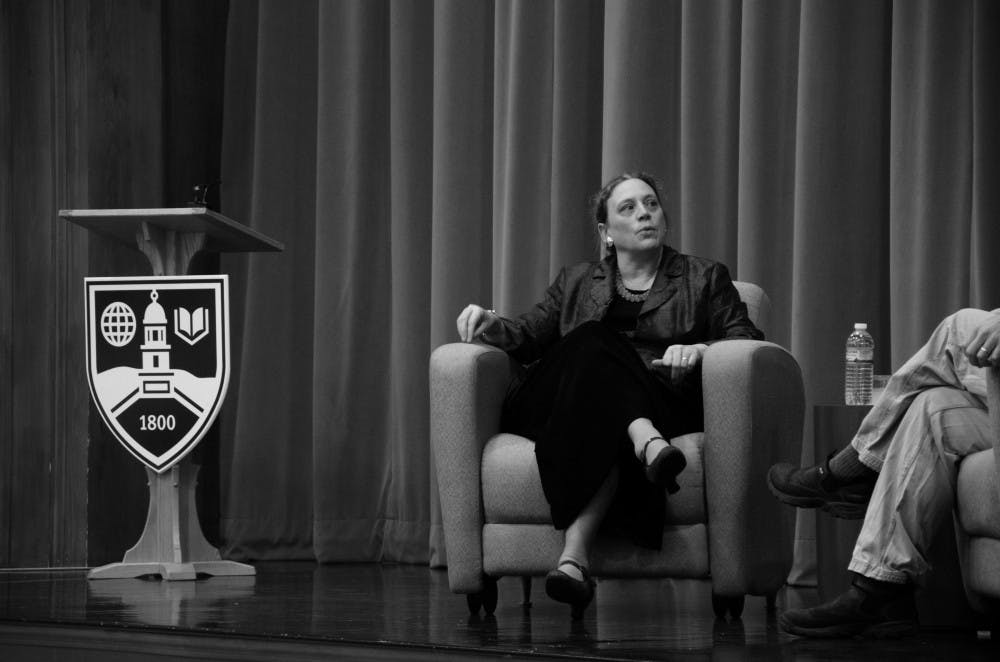What matters to our President Laurie L. Patton, and why?
The Center for Social Entrepreneurship (CSE) hosted its third “Reflection Friday” on Nov. 6 in Wilson Hall featuring President Patton. Middlebury’s Reflection Fridays consist of an hour-long reflective talk by a student, faculty member, staff member or alumnus/alumna during which he or she responds to the prompt: “What matters to me and why?”
This new program provides an opportunity for students, faculty and staff to “come together, break bread, [and] slow down,” CSE Director and Professor Jon Isham said.
President Patton explained that the way she thought about this prompt was by asking herself, “What is my question? The one question I’ll never be able to answer and I’ll never get tired of asking.” Each person has this type of question, one that does not necessarily get at our passion or identity, but instead seeks to locate each person’s “place of fascination.”
President Patton believes that her question is, “What is the nature of the poet in society?”
“That’s all I care about. Actually,” she said. She explained how learning languages, specifically Sanskrit, became for her a way to access the poetic traditions of different cultures, and how her study of poetry and religion emphasized to her the importance of the poet in allowing people to have a voice. She is currently studying women who teach Sanskrit in India. These women now have access to a language that was prohibited to them for three thousand years.
While the role of the poet in society is to help people have a voice, President Patton related that to her role as an administrator to help people “come to voice” in the “most poetic way possible.” She defined “coming to voice” as a transformative type of participation that allows a deep and new meaning come to surface.
Professor Isham went on to ask President Patton how she realized this was her question. In response, Patton asked another question, “Why do I care that people have voices?”
She spoke of growing up in Salem Village, a town still intimately connected to the history of the Salem Witch Trials. Living there made her realize even small communities have the power to violently oppress. She was struck by how those persecuted, mostly women, were silenced. She connected this historical silencing to her personal upbringing, and how she felt in her family that she did not have a voice, and found herself wondering if she even deserved one.
At Harvard, where Patton spent her undergraduate years, she felt “deeply inadequate.” Though she appreciated the extraordinary religion department and feels indebted to the opportunities she was able to pursue through Harvard, what she remembers most was an “educational environment that just felt false.”
“It always felt like we were watching each other’s image of each other.”
It was only through a Harvard graduate class on Anglo-Saxon poetry, taught by professor and playwright William Alfred, that Patton was able to explore her curiosity freely without judgement.
She contrasted the environment at Harvard with her experience in graduate school at the University of Chicago.
“[There], people were always arguing, but they loved each other while they were arguing,” she said.
For Patton, this type of educational environment emphasized the importance of voice in education, and the role that feeling heard can have in facilitating personal transformation.
President Patton highlighted what she called a “Middlebury signature” – our ability to reflect on the meaning of education. She took the opportunity to offer her own reflection, remarking that people stay in education because there is some moment of joy they cannot forget. She believes that we need to foster and build on these moments and let go of attempts at “effortless perfection.”
Livi Raggio ‘15.5 connected this approach to education with broader engagement in our community: “Although it should theoretically be so easy for us to get outdoors and go hiking, or take advantage of being in Vermont in some other way, I’ve found it’s often difficult to do so without compromising academics or getting behind. I’d love to see the culture relax a bit at Middlebury so that students felt more able and inclined to leave campus and learn more about Addison County.”
President Patton asked the audience, “What would ‘slow education’ at Middlebury look like?” She gave some examples of her own, including a surprise cancellation of class, a “no multi-tasking” day. She asked, “What if one day a month, or a week, we did one thing? What would your one thing be?”
Elias Van Sickle ’18 reflected, “I left the talk feeling like the sum of her experiences as well as her broad awareness, compassion and understanding of the human condition make her capable of affecting great, positive change.”
Check out next week’s “Reflection Friday” on November 20 at DKE House: Daniel Loehr ’13.5, Root-Tilden-Kern scholar at the NYU School of Law, will reflect on what matters to him and why.



